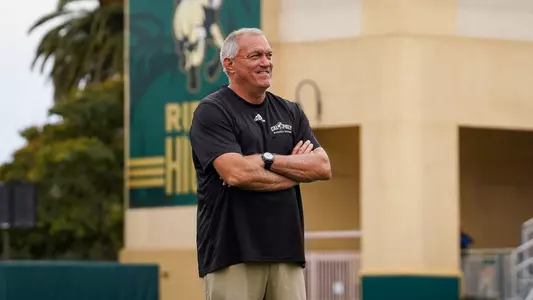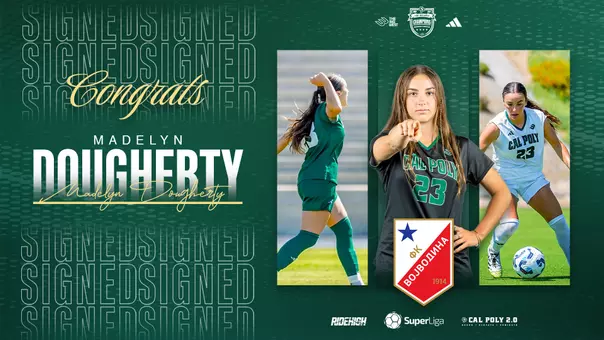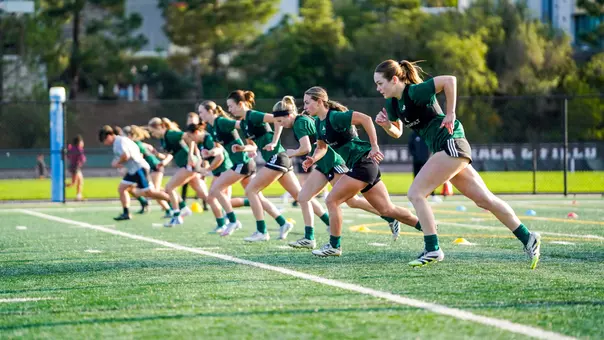
'I Wouldn't Trade it for Anything': The Origin Story of Cal Poly Women's Soccer & Alex Crozier
12/18/2024 5:00:00 PM | Women's Soccer
SAN LUIS OBISPO, Calif. — In 1991, Alex Crozier approached Jerry Smith about a possible volunteer coaching opportunity with the Santa Clara women’s soccer team. But before the long-time head coach for the Broncos said yes, he had one question — “You’re an engineer, why do you want to do that?”
Alex’s response: “I want to be the coach at Cal Poly.”
At that time, women’s soccer was not a sponsored sport at Cal Poly, the school only had a club team. But Alex knew if the chance ever did arise to return to his alma mater and coach, he wanted the job.
About a year later, Cal Poly officially added women’s soccer as part of a plan to move up from Division II to Division I as an athletics department. Alex quite literally spoke the opportunity into existence and the rest is history.
“I can’t imagine ending up at a better place,” he said.
After 33 years, 630 matches and 326 victories, Alex Crozier officially retired as the Cal Poly women’s soccer head coach following the conclusion of the 2024 season this fall.
As the only head coach in the history of the program, Alex admits it’s hard to put 33 years in perspective — but one anecdote just might. In his final season at the helm this fall, Alex had the opportunity to coach the daughter of one of his former players. Aynsley Conner, a senior on the 2024 team this fall, is the daughter of Cathie Cardoza Conner, who played on Alex’s inaugural team at Cal Poly in 1992.
“It’s gone by in a flash and every year is a new adventure … every year is different,” he said. “It sounds like a long time and it is a long time — it’s over half my life — but I wouldn’t trade it for anything.”
But coaching wasn’t something Alex always envisioned doing, he kind of just fell into it — quite literally by accident.
“It’s weird, things happen in your life, and you look back and you think, I think that happened for a reason,” he said.
It all started with a hairline fracture …
Playing soccer at the collegiate level wasn’t a goal of Alex’s growing up in Fresno and attending Bullard High. Fresno State, Fresno Pacific and Fresno City College all recruited him, but the aspiring engineer had his sights set on going to Cal Poly. At the time, Alex didn’t even know if the Mustangs had a men’s soccer team, but if they did, he was going to try out.
Fortunately, they did and that’s when Alex first met longtime Cal Poly men’s soccer head coach Wolfgang Gartner, who would later become a mentor for Alex and help the winningest head coach in Big West women’s soccer history find his way back to Cal Poly.
Following his freshman season for the Mustangs in 1979, Alex was playing in an intramural soccer game during the winter when a freak tackle led to him suffering a hairline fracture in his tibia. The ensuing season, Alex played in one match before reaggravating the injury, forcing him to redshirt.
In the spring of that year, Judy King — Alex’s future wife —, Katey Kennedy and a host of others created the Cal Poly women’s soccer club. A handful of Alex’s teammates started coaching the team and when it was decided that Alex was going to utilize his redshirt during his second year in 1980, they asked him if he’d be willing to help out and coach while he was injured.
“I didn’t know what I was doing, but I gave it a shot,” he said.
It was Alex’s first taste of coaching and little did he know where that one opportunity and four years of assisting the women’s club team would lead.
After shining at midfielder for the Cal Poly men’s soccer team from 1981-83 and earning All-Conference honors in 1982 and 1983 while serving as a team captain, Alex graduated with his civil engineering degree in 1984 and moved to the Bay Area to start his engineering career.
Alex quickly joined a men’s team there and then a co-ed team, that his future wife, Judy, would also join once she graduated from Cal Poly and moved to the area. Eventually, Judy started playing on a women’s club team and one day the squad was in need of a coach. Judy mentioned to her teammates she knew someone who could coach — and Alex was the man for the job.
“She didn’t mention we were dating,” Alex joked.
Alex switched engineering jobs from a private firm in Los Gatos to working for the city of Milpitas. He then added two more coaching jobs to his plate, giving him a total of three on top of his job and playing for a men’s team.
“I wasn’t getting paid, I just loved to coach,” he said.
Then Alex got hired away to a private firm in Santa Clara and after about a year there worked his way up to managing the entire engineering group. That’s about the time when an opportunity to volunteer on the Santa Clara coaching staff two days a week came about.
“Every day, I’d walk by my boss’ office at 5 p.m. to leave for soccer practice and he’d just shake his head like I can’t believe I agreed to this,” Alex said. “At that point, it became clear that engineering was paying the rent, but I really loved coaching soccer.”
Both Alex and Judy desperately wanted to find a way back to San Luis Obispo and a chance arose in 1992 by way of Alex’s dream job. He was informed by his former coach Wolfgang Gartner and a handful of others that Cal Poly was adding women’s soccer as a sponsored sport. He interviewed for the position and expected to hear back that night, but instead he didn’t get any answers for about a week. Eventually, Alex would learn they offered the position to someone else who turned it down.
So the job was there for the taking, he just needed Judy’s permission to make it happen — she gave the stamp of approval not knowing what the next 30 plus years would have in store.
“I think Judy really thought I would be bored after five years and that would be it … but I loved doing it,” he said.
Gallery: Alex Crozier Through the Years
Eight years after graduating, Alex returned to his alma mater to build the Cal Poly women’s soccer program, but it was by no means easy. With a significant drop in pay from his previous job, Alex spent many nights sleeping on the floor and even in a garage for a little while. Given some of the financial challenges, Judy stayed in the Silicon Valley and kept her job, meaning the couple would have to commute back and forth if they wanted to see each other. As a result, Alex focused on recruiting players in the Bay Area as much as possible. Eventually after a year or two, Judy joined Alex in San Luis Obispo and the couple has been in the area ever since.
Alex appreciates everything his wife sacrificed to make this all possible because without her coaching at Cal Poly wouldn’t have become a reality.
“She really made this all work,” he said. “She had a job that allowed me to take this job … so there’s no way I could have done this without her support.”
“I probably would have taken this job for nothing, but I took it for a way lot less than what I was making as an engineer,” he added.
When Alex suffered a hairline fracture in his leg, he never could have envisioned the path in life that injury would lead him down. Because without that freak tackle, who knows if Alex would have fallen into coaching and met his future wife.
“I can’t explain it,” Alex said about the moments that led him back to his alma mater. “It’s almost like it was meant to happen. I still feel like there’s days where like OK there’s still supposed to be something else I’m doing but I don’t know what it is yet, so I just keep moving forward and we’ll figure it out.”
Alex entered his final season at the helm this fall as one of the last active tenured head coaches in all of Division I women’s soccer and ranks in the top 45 all-time in career victories among Division I head coaches. Across his storied career, he led Cal Poly to 10 regular season conference championships, six NCAA Tournament appearances and three Big West Tournament titles. In the program’s second year of existence in 1993, Alex helped the team advance to the Division II national championship match in Miami, where the Mustangs finished runner-up and Alex was named NSCAA National Coach of the Year.
Looking back on 33 years and the number of lives Alex has impacted, he’s most proud of the fact that nearly every student-athlete that has come through the program has had a positive experience. He said he tried his best to create a fun, but competitive environment because “you should enjoy doing what you’re doing, otherwise what’s the point.”
For Alex, coaching was so much more than wins and losses. In fact, the results always took a back seat to teaching life lessons that went well beyond the pitch.
“As I look back on it, it’s less about the soccer and more about the people,” he said. “I enjoyed bringing a group together and seeing what we could create … that’s where I got my joy from, and I got to do it here at a fantastic university with a beautiful sport.
Soccer was just a vehicle that we used here to help people grow and become better versions of themselves, so I think that’s my why, but it’s disguised as a soccer coach.”
Alex isn’t quite sure what the next chapter in life has in store, but he already has a trip planned to Spain this spring to hike Camino de Santiago with Judy, who also recently retired from her job. The hike is roughly 500 miles long and takes experienced hikers about 30 days to complete.
Regardless of what lies ahead, Alex looks forward to tackling it.
“I feel like the program is at a really good point right now,” he said reflecting on his time at Cal Poly. “I’ve learned a ton, and I’ve made a ton of mistakes, but I’ve grown from them, so I’m still trying to figure it all out, but we’ll leave that for someone else to figure out how the rest of the journey goes.”











































































